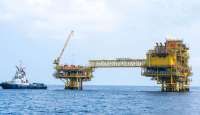MACROECONOMICS - SINGAPORE. Singapore's central bank tightened its monetary policy settings on Tuesday in an out-of-cycle move, as global supply constraints and brisk economic demand elevate inflation pressures across the region.
The city-state's trade-dependent economy is highly susceptible to swings in global inflation and the central bank's sudden move comes as price pressures create unease for policymakers elsewhere in Asia.
Selena Ling, head of treasury research and strategy at OCBC, said she expects the central bank to tighten again in April, describing Tuesday's move as only a "slight tightening."
Read Also: Nasdaq Dives 3%, S&P 500 on Course to Confirm a Correction
"If they had announced a more aggressive tightening today, then that would have dampened expectations for April," she said.
The Monetary Authority of Singapore (MAS), which manages monetary policy through exchange rate settings, said it would slightly raise the rate of appreciation of its policy band.
The width of the band, known as the Nominal Effective Exchange Rate, or S$NEER, and the level at which it is centered will be unchanged.
The MAS last surprised with an off-cycle move in January 2015 when it eased its policy after a collapse in global oil prices.
Other economies are also taking tightening steps.
Last week, Indonesia's central bank surprised markets with 300 basis points of staggered hikes in the reserve requirement ratio for banks over the next eight months.
Singapore's move comes just a day after data showed a price in the city-state climbed in December by the fastest pace in nearly eight years.
"This move builds on the pre-emptive shift to an appreciating stance in October 2021 and is appropriate for ensuring medium-term price stability," the MAS said, referring to its tightening move late last year.
The central bank is due to review its stance at a scheduled semi-annual policy meeting in April, when it was widely expected by economists to tighten again.
The Singapore dollar strengthened to 1.3425 versus the U.S. dollar, its highest since October 2021.
Read Also: French Covid Hospitalisations See Biggest Jump Since November 2020
'DOUBLE TIGHTENING'
Singapore's bellwether economy is expected to grow 3-5%, unchanged from earlier forecasts.
"2022 will be year of double tightening for Singapore - both fiscal and monetary levers will grind tighter," said OCBC's Ling.
The MAS expects core inflation to be 2.0–3.0% this year, from the 1.0–2.0% expected in October. Headline inflation is expected to be 2.5–3.5%, from the earlier forecast range of 1.5–2.5%.
"While core inflation is expected to moderate in the second half of the year from the elevated levels in the first half as supply constraints ease, the risks remain skewed to the upside," the MAS said.
Singapore will release its annual budget on Feb. 18, when the government is expected to announce the timing for an anticipated hike in goods and services tax.
The city-state's economy grew 7.2% in 2021, its fastest pace in over a decade, rebounding from a record 5.4% contraction in 2020. The government has spent more than S$100 billion over the last two years to cushion its economy from the impact of the pandemic.
Instead of interest rates, the MAS manages policy by letting the local dollar rise or fall against the currencies of its main trading partners within an undisclosed band.
It adjusts its policy via three levers: the slope, mid-point and width of the policy band.
/2019/04/16/1728596743p.jpg)









